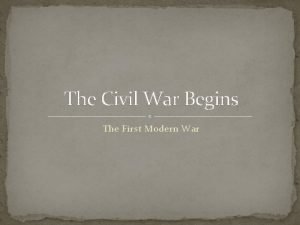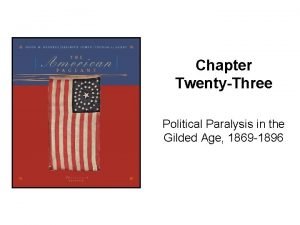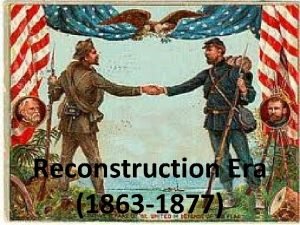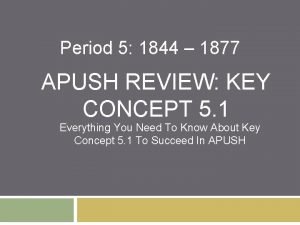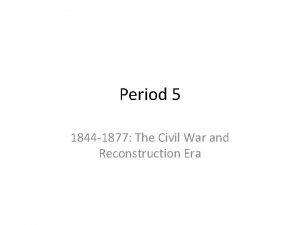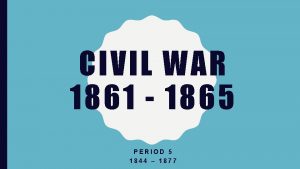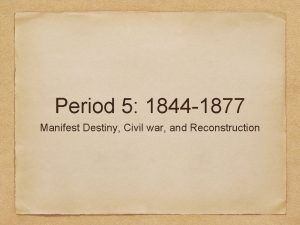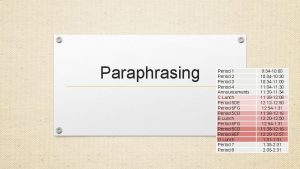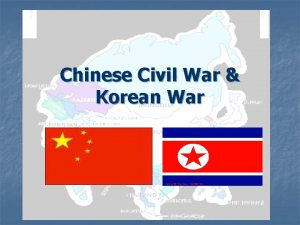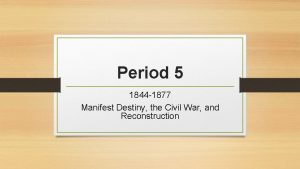Civil War Period 5 1848 to 1877 Think
















- Slides: 16

Civil War Period 5 – 1848 to 1877

Think About It Evaluate the extent the Civil War impacted the political, social, and economic landscape of the United States? To what extent did Reconstruction maintain continuity and foster change in American politics and society?

Fort Sumter, April 12, 1861


Union vs Confederacy Union Population of 22 million Owned… 90% of industry 97% of firearm production 70% of railroad lines Most banking and commerce Confederacy Population of 9 million 3. 5 million are slaves Defensive War Cotton Diplomacy Enrollment Act of 1863 Substitution and Commutation Pay a substitute or pay $300 ($5, 400) to avoid draft “A rich man’s war but poor man’s fight” New York Draft Riots (1863) Hoped to earn foreign recognition

Union Strategy Anaconda Plan Naval blockade surrounding the CSA Mississippi River Divide the CSA in two Richmond Capture the capital with trained urban fighters


Major Battles of the Civil War First Battle of Bull Run (July 1861) First major battle of the war Union significantly defeated by Confederates Myth of quick war leads to realization of long and costly war Antietam (September 1862) Bloodiest day in war: 22, 000 killed or wounded Lincoln soon issues Emancipation Proclamation Vicksburg (May-July 1863) Union control of the Mississippi River, cutting the CSA in two Gettysburg (July 1863) CSA’s Lee’s offensive into Pennsylvania to force peace by the Union or earn foreign support Pickett’s Charge and failure and near destruction of CSA military Deadliest battle of the entire war: over 50, 000 casualties Widely considered the turning point of the war for a Union victory

Gettysburg Address Four score and seven years ago our fathers brought forth on this continent a new nation, conceived in liberty, and dedicated to the proposition that all men are created equal. Now we are engaged in a great civil war, testing whether that nation, or any nation, so conceived and so dedicated, can long endure. We are met on a great battle-field of that war. We have come to dedicate a portion of that field, as a final resting place for those who here gave their lives that nation might live. It is altogether fitting and proper that we should do this. But, in a larger sense, we can not dedicate, we can not consecrate, we can not hallow this ground. The brave men, living and dead, who struggled here, have consecrated it, far above our poor power to add or detract. The world will little note, nor long remember what we say here, but it can never forget what they did here. It is for us the living, rather, to be dedicated here to the unfinished work which they who fought here have thus far so nobly advanced. It is rather for us to be here dedicated to the great task remaining before us—that from these honored dead we take increased devotion to that cause for which they gave the last full measure of devotion—that we here highly resolve that these dead shall not have died in vain—that this nation, under God, shall have a new birth of freedom—and that government of the people, by the people, for the people, shall not perish from the earth.

Monitor vs. Merrimac

The Union and Blacks/Slaves The idea of ending slavery was difficult for Lincoln Border states were slave states, ex. Kentucky Slavery is constitutional Racism in the North and among Democrats Re-election in 1864? Emancipation Proclamation (January 1, 1863) “freed” slaves in Confederate states Slavery became an “official” cause of war Army of Freedom 54 th Massachusetts (Glory) - unequal pay 200, 000 participants; 37, 000 casualties Thirteenth Amendment (December 1865)

Lincoln’s Politics and Civil War Lincoln and Congress Radical Republicans Conservative Republicans War Democrats Copperheads/Peace Democrats Constitutional Powers and Rights Ex parte Merryman (1861) Suspension of habeas corpus by Lincoln unconstitutional Ex parte Milligan (1866) Civilians cannot be tried in military courts if civil courts still operating Copperhead Propaganda

Election of 1864 Abraham Lincoln (R) Ran as National Union Party Andrew Johnson (D) as VP running mate Fall of Atlanta ensured reelection George Mc. Clellan (D)

Total War General Ulysses S. Grant General Sheridan and “The Burning” General Sherman’s March to the Sea

End of the War Appomattox - April 9, 1865 Lee surrenders to Grant Confederates until the very end… Guerilla tactics and “The South will rise again!”

Cost of the War Union: 110, 000 KIA 250, 000 Died from war effects 275, 200 wounded Confederacy: 93, 000 KIA 167, 000 Died from war effects 137, 000 wounded TOTAL DEAD: 625, 000* North Cost: $2. 3 B ($54 B) South Cost: $1 B ($23 B) South Destruction: $1. 5 B ($35 B) American Revolution: 4, 435 War of 1812: 2, 260 Mexican-American War: 13, 283 Spanish-American War: 2, 446 World War I: 116, 516 World War II: 405, 399 Korea: 36, 574 Vietnam: 58, 220 Persian Gulf War: 383 Iraq War: 4, 486 Afghanistan: 2, 145 TOTAL: 646, 147
 Think big think fast
Think big think fast Why was the civil war the first modern war
Why was the civil war the first modern war Toward civil war lesson 3 secession and war
Toward civil war lesson 3 secession and war Civil rights webquest
Civil rights webquest 1877 golden 1
1877 golden 1 Bourbon triumvirate definition
Bourbon triumvirate definition The key tradeoff featured in the compromise of 1877
The key tradeoff featured in the compromise of 1877 Gilded age strikes
Gilded age strikes Tanssija 1877-1927
Tanssija 1877-1927 Joseph pulitzer apush
Joseph pulitzer apush 1877-1865
1877-1865 Reconstruction era art
Reconstruction era art Compromise of 1877 apush
Compromise of 1877 apush Whats the compromise of 1877
Whats the compromise of 1877 1894 railroad strike
1894 railroad strike The gilded age 1877 to 1898 worksheet answers
The gilded age 1877 to 1898 worksheet answers Compromise of 1877
Compromise of 1877

